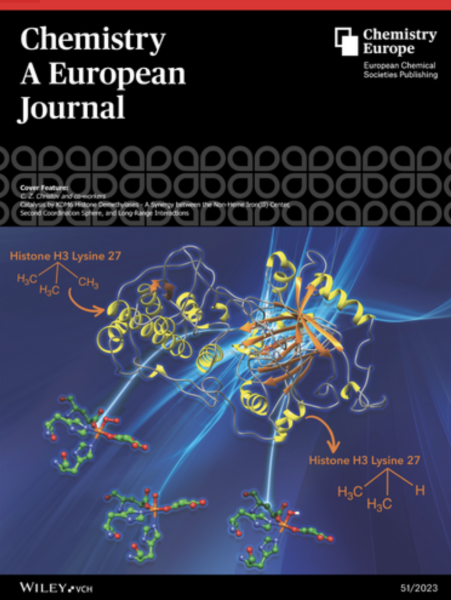
A research team led by Professor Christo Christov (Chem) published the article “Catalysis by KDM6 Histone Demethylases – A Synergy between the Non-Heme Iron(II) Center, Second Coordination Sphere, and Long-Range Interactions,” in Chemistry – A European Journal. The article was selected for a journal cover feature, prepared with the help of Sarah Atkinson.
Many researchers contributed, including Ph.D. student Bathir Jaber Sathik Rifayee (chemistry, the first author); Ph.D. graduate Shobhit Chaturvedi ’22 (M.S. Ph.D. Chemistry, currently a postdoctoral researcher at UCLA); undergraduate students Cait Warner (biological sciences), Jon Wildey (chemical engineering) and Walter White (chemistry); Associate Professor Martin Thompson (Chem); and Professor Christopher Schofield of the University of Oxford, U.K.,
The study revealed the catalytic mechanism of the non-heme Fe(II)/2Oxoglutarate-Dependent histone demethylases from class 6 – KDM6A and KDM6B – enzymes involved in epigenetics regulation and being validated target for drug design. The study revealed the vital role of the second coordination sphere surrounding the non-heme iron center to stabilize the key catalytic species along the catalytic cycle and importantly elucidated the differences in the transition state-stabilization residues between the two enzymes, thus providing background for enzyme-specific drug design.
This research is supported by NIH grant 1R15GM139118.
About the Chemistry Department at Michigan Tech
Chemists at Michigan Technological University help students apply academic concepts to real-world issues and advance research making contributions to health and well-being, environmental protection, responsible use of materials, and climate stabilization. The Chemistry Department offers five undergraduate degrees, an MS and PhD in Chemistry, and an accelerated MS. Supercharge your chemistry skills to meet the demands of a technology-driven society at a flagship public research university powered by science, technology, engineering, and math. Graduate with the theoretical knowledge and practical experience needed to solve real-world problems and succeed in academia, research, and tomorrow’s high-tech business landscape.
Questions? Contact us at chemistry@mtu.edu. Follow all the latest happenings on the Chemistry Blog.